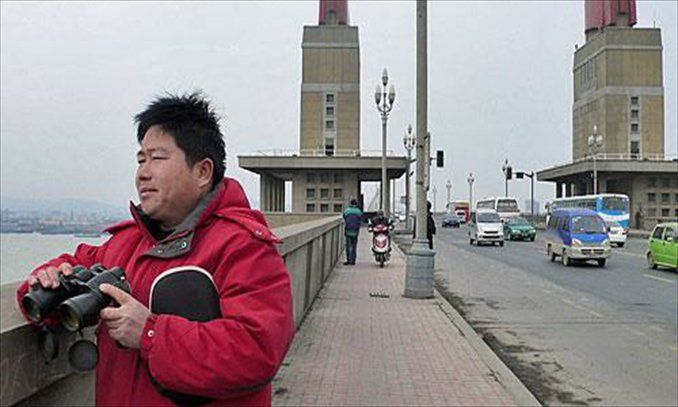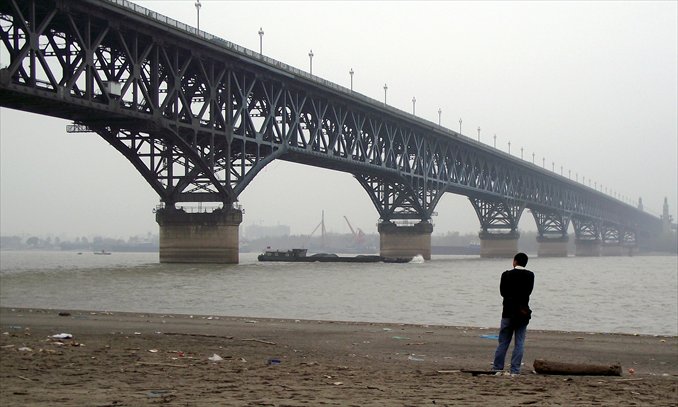Man devotes life to thwarting suicide attempts, rehabilitating


If you get the chance to visit Nanjing Yangtze River Bridge, don't be surprised to see a middle-aged man walking to and fro on the span, watching pedestrians through his binoculars.
Chen Si, a Good Samaritan in Nanjing, Jiangsu Province, is looking for his targets: suicide attempts. In the past decade, he has spent all his weekends and holidays, rain or shine, saving people who attempt to jump into the river from the bridge. He has saved more than 200 people.
He has had his fair share of ups and downs, including the loss of a close relative to suicide, which have steered him toward this role of saving desperate souls.
"It made me think, why would people kill themselves? If someone gives them a hand at that critical moment, what are the chances they'll go through with it?" Chen, who works at a logistics company in Nanjing, told the Global Times.
Chen, 46, has sacrificed a lot to be a suicide watchman. With a monthly salary of 3,000 yuan ($481), he has spent over 130,000 yuan on lodging for those he saves. He rents a two-room house where each survivor is invited to stay after their attempted suicide, and they receive free psychological counseling from Chen and his university volunteers.
Although donations help him continue his work, Chen said his wife complains a lot about him spending so much time and money on other people. He also feels badly that he could not save enough money to enroll their daughter in an advanced class in school.
But he cannot turn his back on the struggling people on the bridge.
True lifeguard
Chen was born to a poor family in Suqian, Jiangsu Province. He dropped out of high school and went to Nanjing to work when he was a teenager. For a long time he was very poor. At the worst of times, he slept under overpasses.
Finally, in the 1990s, he opened a fruit stand and things began to look up. One day in 2000, he saw a young woman in her twenties while he was driving his fruit truck. She looked incredibly distraught and had been crying. Suddenly, she made a move to climb onto a bridge railing, and he realized she wanted to kill herself. He rushed over to her and saved her.
"It was a natural response," Chen said.
He was deeply affected by this incident, and it was only a few years later that the issue of suicide hit close to home. In 2003, an elderly relative of his whom he was very close to committed suicide after his sons disputed over who should shoulder the responsibility of taking care of him.
"Life is too fragile. If one of his sons had shown a little filial piety, he wouldn't have ended his life," Chen said.
After the incident, Chen was determined to be a suicide watchman. Then he read in the newspaper that Nanjing Yangtze River Bridge was a common site for local suicide attempts - more than 2,000 people have killed themselves by jumping off the bridge, according to local media.
Chen keeps an online diary documenting his encounters with the desperate people on the bridge. The reasons for the suicide attempts vary. Some had broken up with their lovers, others had gambled away their savings. There were also people whose businesses had failed.
Chen recalled the case of a migrant worker who gave his surname as Shi. Shi tried jumping off the bridge because he was under mountains of debt due to his daughter's acute leukemia treatments.
Even though Chen saved his life, Shi still lived in fear of debt collectors, making Chen wonder how to take his rescues to the next level.
"I saved their lives. But I had no ability to solve their problems. They had to face the same miserable lives after they'd been saved. But I couldn't do anything. For some of them, living is as good as being dead," he said.
Chen was perplexed over whether he had a right to stop them from giving up, asking himself again and again, "Should I save their lives or help their spirits move on after their death?"
Eventually, this Good Samaritan saw another, more lasting way to help them.
Soul station
Saving them from the bridge is merely a small step, Chen says. "Just pulling them away from the bridge doesn't mean they have been saved. I have to help them rebuild their confidence and ignite a new hope for life. Only then can they move on with a new life."
Chen spends 10,000 yuan annually on the rental of the two-room home near the bridge. He calls the place "a station for your soul to rest in." Guests can stay in the house as long as they want.
"I bring them back to my station, sit with them and ask them to share their stories," Chen said.
"It's all about making friends. Only after they trust you will they share their pain and suffering. After that, you can persuade them to see past it all and lead them to walk out of the shadows," said Chen, who reads books on psychology in his spare time.
It takes a lot of time and patience to get through to these lost souls. One man refused to talk after being at the station for two days. Chen got him to open up after he plied the man with booze.
Sometimes, he brings survivors back to the bridge to help him rescue others. "When they participate in saving others, they forget about their own plight and shoulder the responsibility of helping others," he said.
His greatest joy is receiving good news from the people he has rescued, but his efforts get tripped up from time to time as volunteers come and go.
April and October see a lot of suicide attempts, and during these peak periods, his station, which accommodates four, is full.
"I admire what he has accomplished, but he can't do it all alone. Everyone should work to save people who try to commit suicide," volunteer Cheng Yunlin said.
Chen also hopes for a future where the local government and citizens work together to help those who are suicidal.
"I am an ordinary guy, and a stranger to suicide, and I can save them. If these people's friends and relatives intervene when they begin to have suicidal thoughts, how could they arrive at such desperation?" Chen queried.
Each year, more than 250,000 people commit suicide in China, and 2 million attempt to take their own lives, according to statistics from China Centers for Disease Control and Prevention.